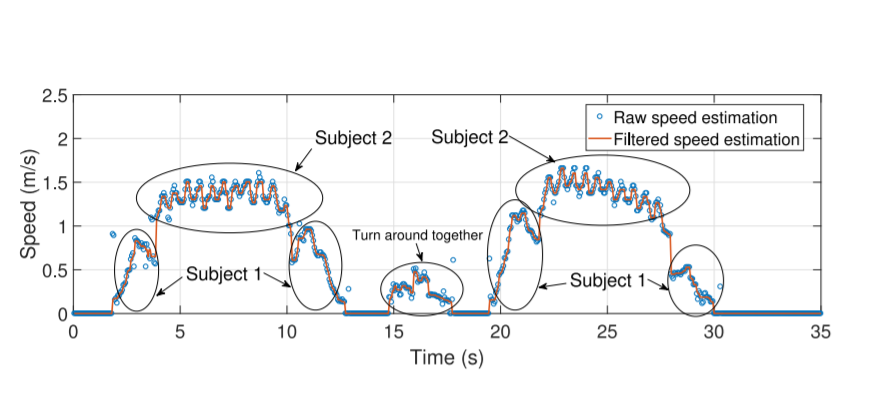News Story
Professor Ray Liu Awarded 2020 IEEE IoT Journal Best Paper Award

Two subjects walking in the environment.
Distinguished University Professor and Christine Kim Eminent Professor of Information Technology K. J. Ray Liu has been awarded the 2020 IEEE Internet of Things (IoT) Journal Best Paper Award for his work titled “WiSpeed: A Statistical Electromagnetic Approach for Device-Free Indoor Speed Estimation.” Co-authors on the paper include Feng Zhang, Chen Chen, and Beibei Wang. The IEEE IoT Journal is ranked a top ten journal, with an impact factor of about 10, over 266 journals in Electrical and Electronic Engineering by the Journal Citation Reports from the Web of Science Group that analyzes the influence and impact of scholarly research publications.
With the ubiquitous deployment of IoT devices, it becomes possible to sense and track virtually everything, everywhere. Among the various physical parameters, speed is the most fundamental key parameter because it can provide the richest information about the different aspects of human activities. People have relied on the Doppler shift for speed estimation for over 170 years since its discovery, and it has found great applications in radars, but becomes very unreliable in indoor rich-scattering, non-line-of-sight (NLOS) environments.
Considerable work has been done in search of new physics suited for indoor speed estimation, slow movement with rich multipaths, for several decades. Unfortunately, there has been no accurate and robust solution that can perform well under multipath and NLOS conditions until the groundbreaking discovery of WiSpeed.
Different from the conventional approaches that try to remove the multipath effect, WiSpeed embraces the multipath propagation indoors by leveraging the physical features of EM waves associated with the motion speed. It characterizes the impact of motions on the autocorrelation function (ACF) of the received electric field of EM waves using the statistical theory of EM waves and shows the relation between the motion speed and the ACF of the power of the received electric field, which can be measured by the channel response readily available from commercial wireless devices. By analyzing the different components of the ACF, the speed of motion can be extracted accurately even under the rich-scattering, NLOS conditions.
WiSpeed has made a very fundamentally important discovery for speed estimation under the rich-scattering, NLOS conditions. Many researchers believe it is a major breakthrough in speed estimation since the discovery of Doppler Effect over 170 years ago. It is the world’s first-ever device-free speed estimator that achieves high accuracy, low deployment cost, large coverage, low computation complexity, and privacy preservation at the same time.
The potential uses of WiSpeed, as detailed in Prof. Liu’s paper, shows the possibilities for a number of commercial applications in wireless sensing platforms, WiFi, LTE or 5G systems such as fall detection, gait recognition, and indoor positioning/tracking. It is not only accurate, but is also cost-effective, can cover a large area, and maintains privacy standards. The applications of this discovery have the potential to impact many IoT applications in the near future.
Prof. Liu and his co-authors received their award during the 2020 IEEE SENSORS Conference on October 25-28, 2020. The awards ceremony was held on Tuesday, October 27.
Feng Zhang received his Ph.D. degree in ECE at UMD in 2018, Chen Chen received his Ph.D. degree in ECE at UMD in 2017, and Beibei Wang received her Ph.D. degree in electrical engineering from UMD in 2009.
Published November 16, 2020









